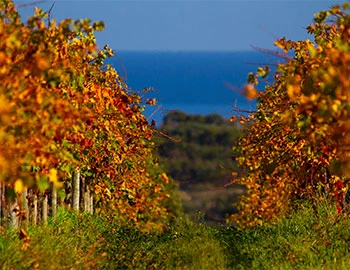
The Surly Muse 2021
Barossa Valley, Massena, 750 ml

| Grape variety: | Viognier, Marsanne |
| Producer: | Massena / Jaysen Collins |
| Origin: | Australia / South Australia / Barossa Valley |
| Other vintages: |
Description
The nose displays aromas of apricots, honeysuckle, wild fennel and grapefruit. The palate is rich yet restrained, with succulent tropical flavours that are matched with fresh acidity, a taught band of minerality and a creamy texture.
Attributes
| Origin: | Australia / South Australia / Barossa Valley |
| Grape variety: | Viognier, Marsanne |
| Ripening potential: | 1 to 3 years after harvest |
| Drinking temperature: | 10 to 12 °C |
| Food Pairing: | Apéro riche, Grilled fish, Giant crevettes, grilled langoustines, Seafood salad, Mushroom ragout |
| Vinification: | fermentation in wooden barrel |
| Harvest: | in several rounds (tries) |
| Maturation: | in used barriques, on the yeast |
| Maturation duration: | 6 months |
| Volume: | 13.5 % |
| Note: | Contains sulphites |
Massena / Jaysen Collins
Dan Standish and Jaysen Collins were college friends, and in the late 1990s they decided to put their talents together to produce wine. Recently, Jaysen Collins has taken charge of the "Massena" project on his own.The grapes are purchased from growers in Greenock, Kalimna and Koonunga Hill in the northwest Barossa Valley.
They are always very old plots and the yields are naturally tiny, but the grapes have an unequalled concentration and complexity. Despite the scorching dry summers, no irrigation is used (a method known as 'dry farming'). The Midnight Run, their first wine, was initially conceived as a wine for family and friends. Its name was inspired by their journeys between Barossa Valley and Clare Valley--during harvest they had to move from one to the other at night and it was then that they had the idea of working together. That blend was based on Grenache from vines over 120 years old. The remainder was Shiraz, Cinsault and Mataro (Mourvedre) in the style of the great Chateauneuf-du-Pape. .

Viognier
Saved from extinction
It’s hard to believe that the Viognier nearly became extinct 50 years ago. Today, it grows worldwide on over 10,000 hectares. The variety was first mentioned in 1781, and probably originated in Condrieu, in the northern Rhône Valley. There, and in the 3.8-hectare mini-appellation of Château-Grillet, vintners kept it on the post when the rest of the world wanted to know nothing about it. Its inventory shrank to a meagre 14 hectares. This is because it provides only low yields, and for a while there were no good seedlings. In the 1980s, interest in Viognier reawakened. It actually shows a unique profile: deep golden with good body and aromas of apricot, lime blossom, citrus fruits, honey and hazelnut. It is popular in the Languedoc region, flows into the white Côtes du Rhône and also does very well in California. The best examples fit wonderfully with poultry in cream sauce, noble fish like turbot or – why not? – lobster.
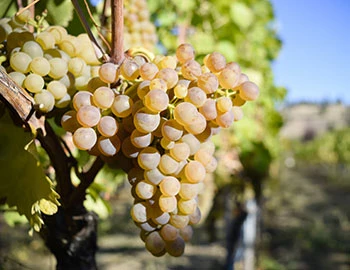
Marsanne
Better in twos than alone
The Marsanne features a distinctive bouquet of flowers, cherries and marzipan. This white grape probably comes from the area around the village of Mars Anna on the Drôme, a tributary of the Rhône. Today, their stronghold is in the northern Rhône Valley, in the fields of Hermitage, Crozes-Hermitage and Saint-Joseph. Wherever Marsanne grows, Roussanne is not far away. Both grapes are closely related. They are even mentioned together in a document from 1781. They complement each other perfectly: the low-acidity Marsanne brings its original flavours, while the Roussanne contributes liveliness. Further south, together they shape the white Côtes du Rhône. However, Marsanne cannot be incorporated into the white specimens of the Châteauneuf-du-Pape. The reason is simple: when grape varieties were being determined in the 1930s, it was not yet known there. It has been cultivated in Australia since the 1860s. In Switzerland, it is known as Ermitage. Here it yields dry and sweet wines with enormous storage ability.
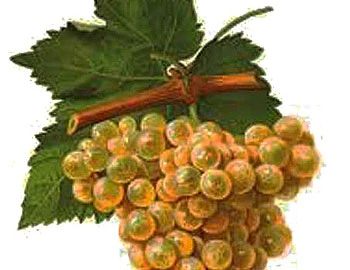
Barossa Valley
Barossa Valley: well-proportioned abundance
The Barossa Valley is the epitome of Australian red wines with lavish fruit richness and focused strength. But the valley is not just a preferred terroir for Shiraz, Grenache, Cabernet, and co. – there are also huge winery facilities where grapes are processed from other cultivation areas in South Australia. Thus, the valley has become a center of Australian winemaking, bringing concentrated yet balanced crops into bottles.
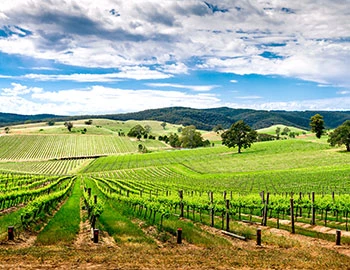
South Australia
South Australia: Shiraz as a driving force
South Australia, with the Barossa Valley as the most well-known cultivation area and the city of Adelaide as a wine metropolis, is without a doubt the centre of the Australian wine economy. The wines produced here have brought the Shiraz from “down under” worldwide recognition. They are fully concentrated wines with dark-berried cassis fruit and masterfully supportive oak wood spices. But Chardonnay, Cabernet Sauvignon, Merlot and Riesling play more than just a supporting role.
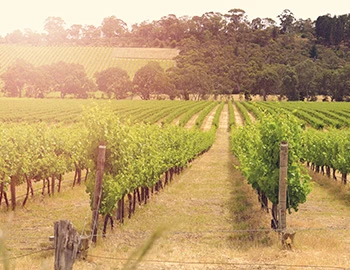
Australia
Australia – A rapid rise to the international elite.
Australia, separated from the other continents by oceans for roughly 50 million years, has almost two hundred years of viticulture history. For a long time, Australians pressed their wines for their own use, with simple, undemanding vines. But later the country began to specialize in classic, European varieties. And with great success –Australian wines today enjoy great prestige and are consumed worldwide..
